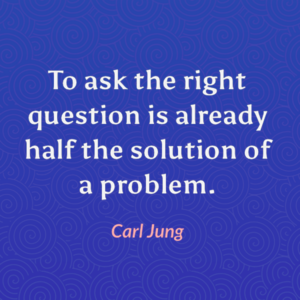 [MB: I’m thrilled to share this newsletter’s first guest editorial, which happens to be a smart response to last week’s issue on asking questions written by educator and poet Rob Pollak.]
[MB: I’m thrilled to share this newsletter’s first guest editorial, which happens to be a smart response to last week’s issue on asking questions written by educator and poet Rob Pollak.]
While it is great to always ask students if they found the session helpful, it’s even better to ask them, “What did you find helpful about today’s session?” This question provides them with an open invitation to think about what they learned during the session, synthesize that information, and then provide you with their own interpretation of the valuable information they learned during the lesson. The feedback here is so much better than a “Yes, it was helpful.” Instead, you get a report card of sorts – one that gives you instant feedback on where your lesson hit the mark. You also get a chance to analyze whether you were successful in teaching the topics that the student did not bring up as helpful. You can then ask follow up questions to gauge their understanding of those topics as well. Afterwards, you’ll have a chance to adjust your lessons for students in the future.
Real OK or Fake OK?
You’ve just finished a banger of a session on completing the square, and you’re feeling super proud of yourself for how efficiently you taught a difficult topic. You finish with “… and that, my friend, is how you complete the square,” take a bow, and wait for the applause from the student. Instead, you hear, “OK.” At this point, you have two options: (1) continue congratulating yourself and then dive into the next topic, or (2) stop and see what that “OK” actually means.
Hopefully, you always pick the latter because if you don’t, you should be prepared to teach that same completing the square lesson soon. Whenever I hear “ok” or “got it” from a student, I stop and ask if it’s a “real ok or fake ok.” I love this question because it eases some of the pressure a student might feel to please the teacher. If it’s a real ok, then ask the student to explain the concept back to you. Usually, they will do a pretty good job. If it’s a fake ok, then you have a chance to think about different ways to deliver the same content so that it connects with this particular student. Additionally, for the quieter students, the teaching period after you’ve allowed them to be vulnerable will often have more of an open dialogue after they admit that they didn’t really get it. You’ll also be humanized to the student because you’re willing to admit that maybe you didn’t explain that topic in a way that connected with the student — an admission that helps establish the trusting relationship that you need in order to help this student make the leap.
The Last Question
Finally, at the end of every session, I ask, “What questions do you have?” I don’t remember where I first heard this advice, but some wise speaker once showed that the best way to end a presentation is to ask “what questions do you have?” and to hold out your hands like this stock photo of a cheerful casual man welcoming with his hands wide open:

If you ask, “Do you have any questions?” it’s too easy for a student to just say “nope” and then leave. But wording it as, “What questions do you have?” convinces them that they actually do have questions they want to ask, and you’re giving them an opportunity to think about them and ask. It’s sort of amazing when you change this because you can actually see the wheels turning in their heads when the question is posed in a more open-ended way. You get better questions, and you get more questions. Try it – you might be surprised…unless it’s Friday afternoon and you just want to go home. Then definitely ask, “Do you have any questions?”
So, what did you find helpful about this, and what questions do you have for me?
Tutor Tips, Tools, and Thoughts
What are the benefits and limitations of behaviourism in instructional design?
How far can focusing on observable and measurable behaviors as the outcomes of instruction take you?
How To Teach Gifted Kids in 7,000 Easy Steps
Everything you need to know (maybe).
The Next Phase of Test-Optional Admissions
Here’s a savvy summary of the current continuum of TO policies.
The Release Ratio: How to Make Use of Everything You Know
How can you increase the ratio of knowledge you create over the knowledge you consume?
Late Hours, Lack of Leave Can Be Damaging to Your Mental Health, CDC Study Says
Do these working conditions sound familiar?
Did you enjoy this issue of Tutor: The Newsletter? Get the next issue right in your inbox by subscribing below–only subscribers get the Tutor Classifieds:
